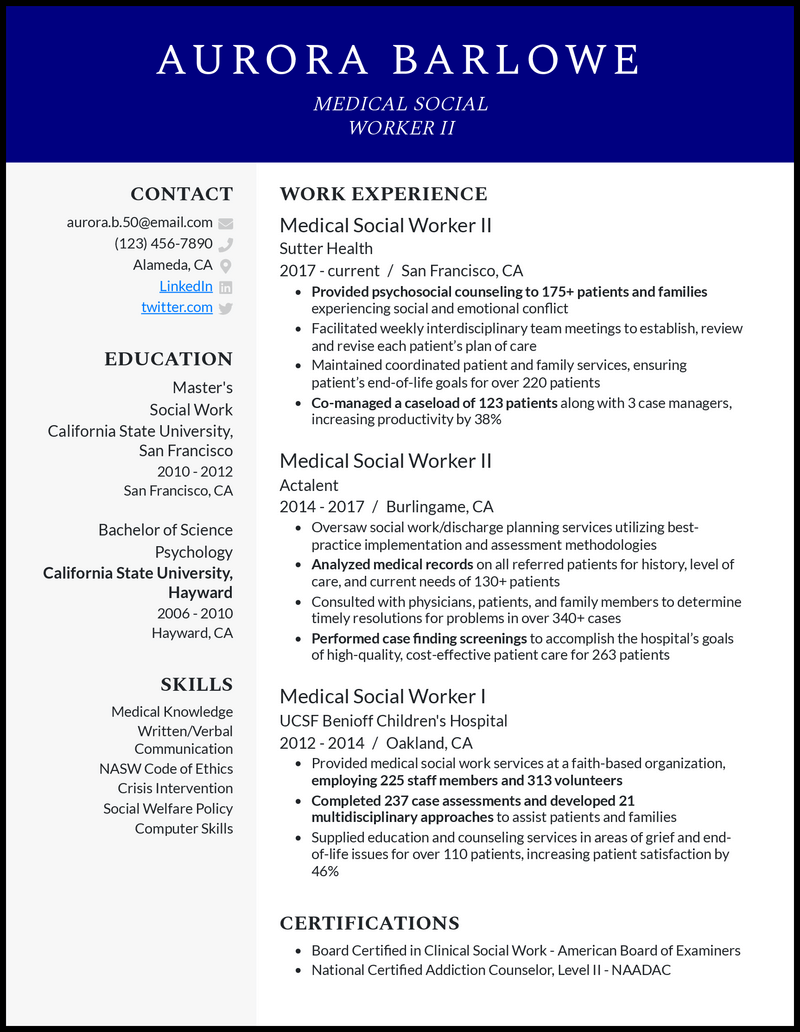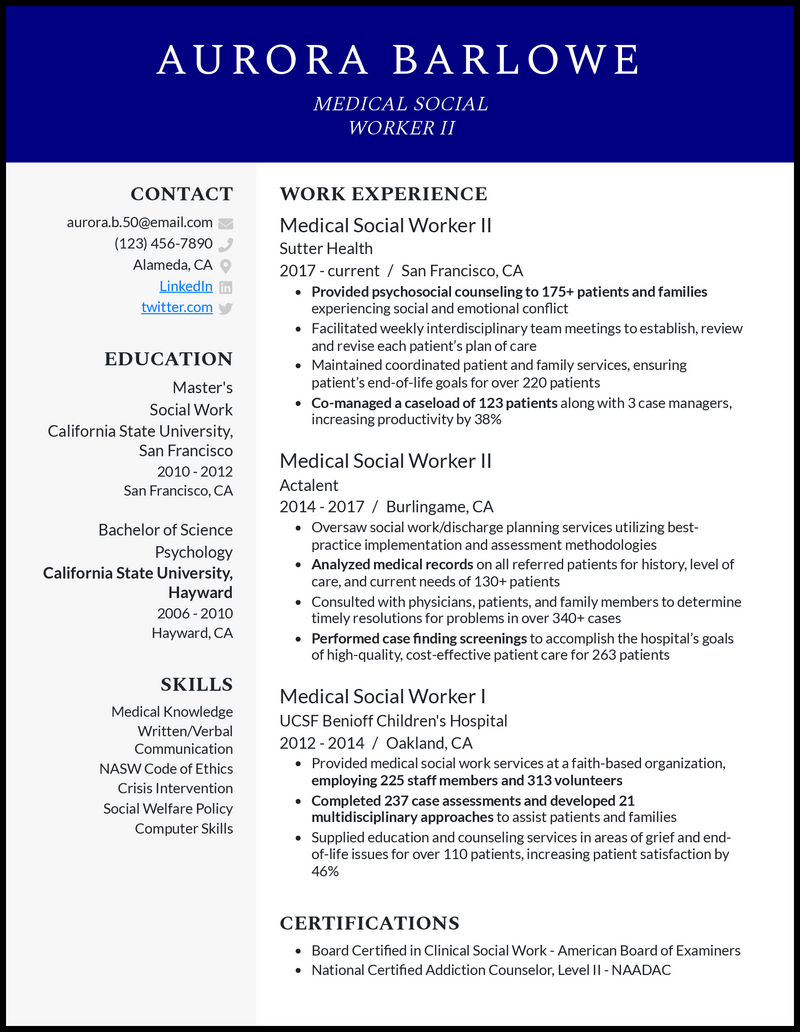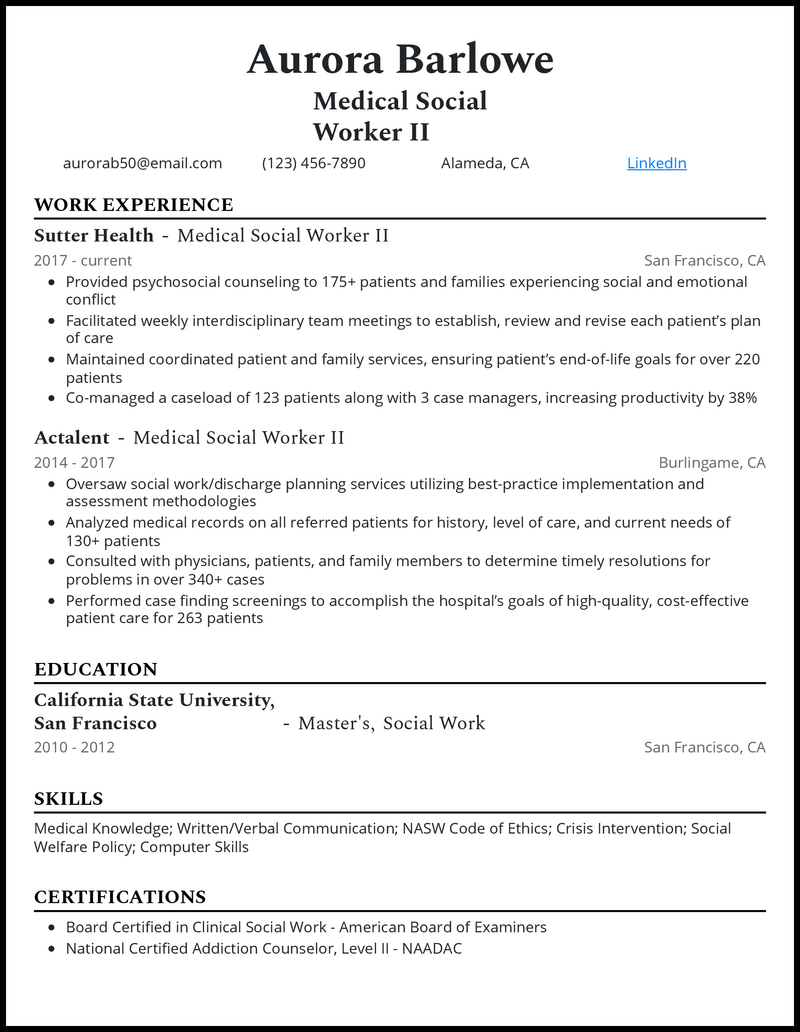Dealing with illness can be difficult to navigate, but you’re there for patients and their families every step of the way: You provide people in need with resources, direction, and advocacy as needed while coordinating with other social workers to see everything through.
But you might have some questions about how to represent everything you do on a resume. Your work is important—so how do you format your resume best?
Don’t worry, we’re here to help. These three resume templates and resume guidance will guide you down the pathway to success as a medical social worker so that you can help people in need.
What Matters Most: Your Skills & Job Experience Sections

As a medical social worker, your skills are a unique blend of technical and interpersonal . . . But you’ll want to be technical in your representation of all of them. Let’s go into detail about how you can give recruiters a preview of how you help your patients.
Everything you list on your skills list should be extremely specific to your profession. Shun anything generic or vague! Even if a skill is valuable, it may not belong on your resume if it isn’t specifically aligned with medical or social work in some form.
Speaking of being specific, make sure you do that! Alongside ensuring that each list item is relevant to your profession, fine-tune your skills to show that you have way more than surface knowledge.
Here’s what we mean:
9 most popular Medical Social Worker skills
- NASW Code of Ethics
- Active Listening
- Crisis Intervention
- Social Welfare Policy
- Conflict Resolution
- First Aid
- MS Word/Excel
- Google Calendar
- Care Planning
Sample Medical Social Worker work experience bullet points
Now that you’ve introduced yourself as a skilled applicant, recruiters want to know how you can apply your abilities in the field. How have you responded to patient crises in the past? How have you adapted healthcare navigation plans according to unique needs?
Again: Make sure everything stays on track and centered around your profession. You want to share past achievements and professional experiences you’ve had that specifically make you a better medical social worker.
Metrics are a great way to show off what you’ve accomplished in a credible and impressive way! Recruiters need to see quantifiable data that backs your claims and measures the impact of your success.
Here are some solid examples:
- Supplied education and counseling services in areas of grief and end-of-life issues for over 112 patients, increasing patient satisfaction by 46%
- Co-managed a caseload of 143 patients with three case managers, increasing productivity by 38%
- Provided psychosocial counseling to 176+ patients and families experiencing social and emotional conflict, boosting success rates by 17%
- Consulted with physicians, patients, and family members to determine timely resolutions for problems, achieving a personal feedback rating of 4.8/5.0 stars
- Completed well over 230 case assessments, developing more than 21 multidisciplinary approaches to assist patients and families, elevating team efficiency by 12%
Top 5 Tips for Your Medical Social Worker resume
- Show depth of knowledge
- Remember: You want to be specific with your qualifications in an area that shows you’ve gone deeper than surface-level knowledge. Use specific medical terminology when applicable, and name software clearly.
- Vary your context
- Another way to show your expertise is to vary the context surrounding your experience points. Recruiters want strong, solid pieces of information that leave them wanting to know more: Providing the context for your metrics and details adds an air of confidence and memorability to your resume.
- Use a highly professional template
- Your role involves a hefty dose of approachability since you help so many people dealing with difficult situations, but your resume template should be sleek and professional. Don’t try to brighten it up too much with fancy colors or unusual fonts—you’re writing for the recruiters, not your patients.
- Make it quick!
- Keep your experience points as brief as you can while still covering all the necessary info. On average, recruiters only have a few seconds of their time for your resume. Make it count! What did you do to help your patients or team? What tools did you use to do it? And what numbers show improvement or other results?
- Certifications deserve attention
- You should have some recognition for all the hard work you put into earning those certs! Always spotlight them on your resume. They add to your credibility, so dedicate a whole section to your NAADAC or Clinical Social Work Board Certification.
We know you’ve undoubtedly handled a vast array of difficult and moving situations through your work, but it’s important for you to make the highlights fit on one page or less.
Any points you don’t have room for on your resume can be repurposed as the foundational elements for writing an effective cover letter. A cover letter will complement your resume nicely while providing extra details about the cases you handled that qualify you to help others in need.
Another way to spruce up your resume and add interest is to vary your metrics. It can be tricky to avoid everything being a percentage of either increasing or decreasing something, but try to think of other metrics like star ratings or budget changes to add to the mix.








